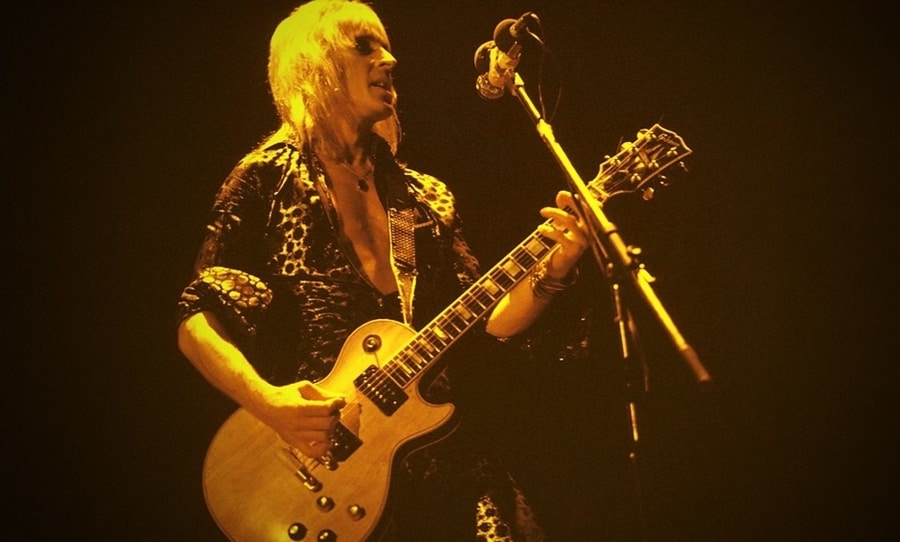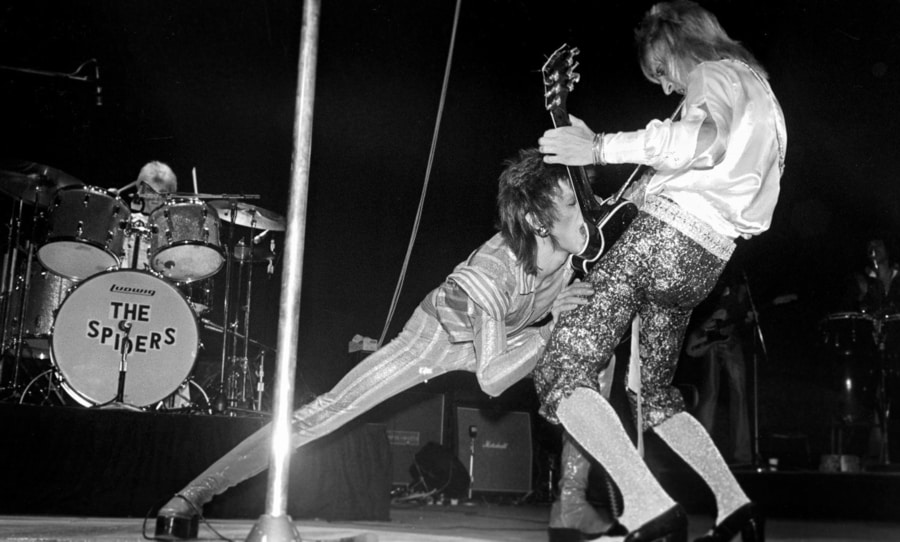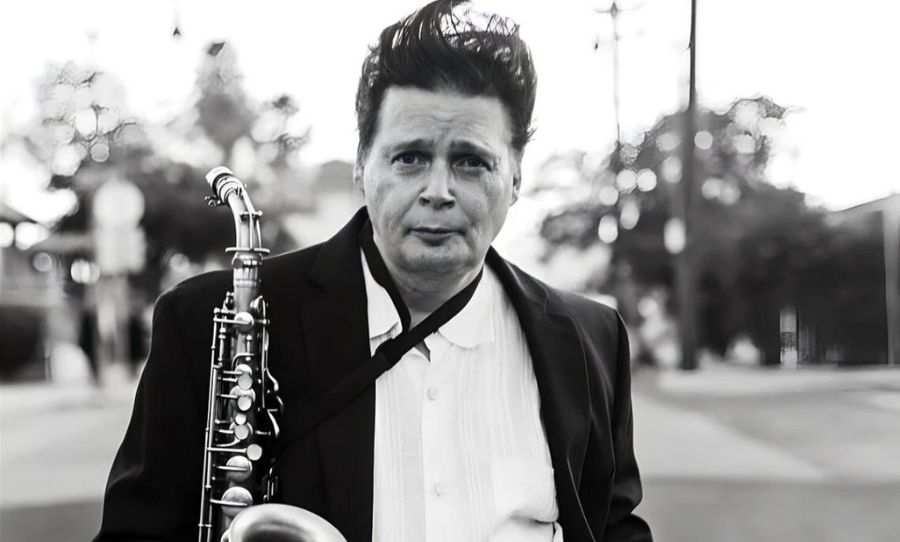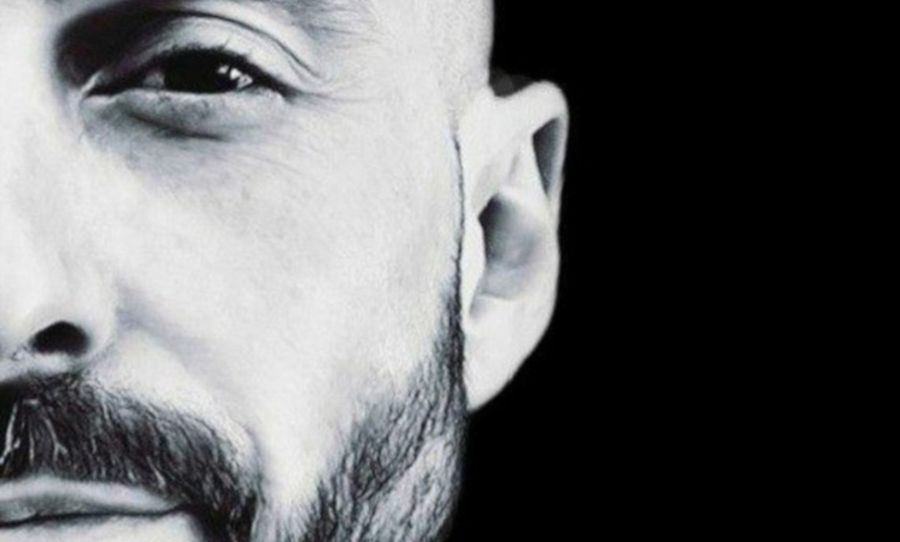Mick Ronson, producer and guitarist for David Bowie is one of 70s music’s most important figures. We take a look at his influence on glam and punk.
The legendary guitarist and producer Mick Ronson was best known for his work alongside David Bowie in the 1970s. But Ronson was much more than just a sideman.
In this feature piece, we pay tribute to Ronson’s legacy, including being widely regarded as the best guitarist who ever played for David Bowie, his stunning arrangements and productions for artists from Lou Reed to John ‘Cougar’ Mellencamp (and of course Bowie too), and his influence on glam and punk.

Bowie’s “best guitarist”
Ronson first met up with Bowie in February of 1970. He had played in a number of bands since entering the English music scene in 1963, including in bands like The Mariners, The Rats and The Crestas, as well as playing on an Elton John session in 1970 for the unreleased track “Madman Across the Water”.
Ronson met with Bowie and Ken Scott, the engineer who had joined Bowie on the 1969 album David Bowie (re-released in 1972 as Space Oddity). Ronson joined Bowie’s band then named The Hype, performing with him on BBC Radio two days later, and worked on Bowie’s 1970 album The Man Who Sold The World.
At the time, Ronson wasn’t overly impressed by Bowie. The Man Who Sold The World sold modestly, and though (according to old interviews used in the 2017 documentary Beside Bowie) Ronson saw Bowie as a ‘nice guy’ he had some creative chemistry with, he wasn’t sure if he’d be invited back and never saw Bowie as a superstar.
That is, until Bowie’s 1971 album Hunky Dory. When Ronson heard the songs for the album, he said: “Oh fuck; he’s going to be huge“. Hunky Dory was Ronson and Bowie’s first project they produced together and the partnership made the album flourish.
On it, you can hear Ronson deploy the beautiful and inventive composition tricks that made the album a classic. Ronson’s lush piano and string arrangements propel many of the songs, like the immortal Changes, Oh! You Pretty Things and – of course – Life on Mars? – with glissandos, careful accenting and masterful use of the piano’s whole range. At the end of Life on Mars? you can even hear Ronson yell out “fucking bastard!” as a telephone call to the studio interrupts a string take.
Ronson was also a masterful guitarist, and on Queen Bitch we get the first taste of his buzzy, in-your-face sound that would characterise Bowie’s next album Ziggy Stardust and the Spiders from Mars, which took influence from American proto-punks The Velvet Underground and Iggy & The Stooges.
The period also produced a number of memorable live performances, with Bowie sometimes simulating fellatio on Ronson’s guitar on stage. Though the two split in 1973, Bowie later regarded Ronson as one of his most treasured creative partners.
“As a rock duo, I thought we were every bit as good as Mick and Keith […] Ziggy and Mick were the personification of that rock n roll dualism”, Bowie said in a 1994 interview. Later Bowie guitarist Earl Slick dubbed Ronson “the best guitarist Bowie ever had” in the 2017 documentary Beside Bowie.

Ronson the producer and songwriter
It’s important that Ronson isn’t only talked about as Bowie’s guitarist; his influence extends further. His work on Lou Reed’s Transformer provided some of the most colourful and memorable moments on that album, like the piano on Perfect Day, the creative pairing of upright and electric bass on Walk on the Wild Side, and his backing vocal ideas for Satelite of Love (sung by Bowie).
One of the most underrated moments on this album is the beginning of Make Up, with its bass trill and Al Green-style guitar lines. Opening track Vicious sees Ronson rip leads like a chainsaw over an unmistakably Lou Reed rhythm guitar part. Overall, Ronson provided a musical vocabulary to Lou Reed’s music that wasn’t part of Reed’s earlier minimalistic style nor replicated on any later of Lou Reed’s later solo work.
Ronson’s solo work extends three albums, most notably Slaughter on Tenth Avenue, which integrates a wide range of styles and shows off Ronson as a completely capable and singular frontman in his own right. Only After Dark shows how much of the iconic early 70s sound of Transformer and the Bowie albums originated with Ronson.
Ronson even deserves credit for John ‘Cougar’ Mellencamp’s most famous hit, Jack & Diane. Those familiar with Ronson’s style know his penchant for percussion, and Mellencamp has said in Classic Rock Magazine that his touches in that department made the song:
“I owe Mick Ronson the hit song ‘Jack & Diane’. […] Mick said ‘Johnny, you should put baby rattles on there.’ I thought, ‘What the fuck does put baby rattles on the record mean? So he put the percussion on there and then he sang the part ‘let it rock, let it roll’ as a choir-ish-type thing, which had never occurred to me. And that is the part everybody remembers on the song. It was Ronson’s idea.”
Proto-punk icon
Ronson’s sound and style had an immeasurable influence on the 70s glam scene, and, in turn, the beginnings of punk. Ronson was known for playing a ’68 Gibson Les Paul that he had stripped all the paint off of, believing it gave him better resonance.
Ronson ran his Les Paul always into a Marshall stack, and favoured the Marshall Major heads bearing KT88 tubes. Mick got most of his gain from the amp itself by driving it as hard as possible; given that the Marshall Majors were a 200-watt tube amp, this would have blown the roof off of most venues!
Mick used few pedals. Of these, a Sola Sound Tone Bender MK1 (an early fuzz) and a Dunlop Cry Baby Wah were favoured. One of the main tricks he employed was “cocking” his wah to achieve his signature buzzy and snarly tone. This just involves leaving the wah at one certain position rather than revolving it dynamically as most users do. In the studio, he would slowly tilt it up and down until he got the tone he wanted and then leave it at that setting, never really fiddling with the EQ on his amp.
The cocked wah sound boosts a lot of the high-mids of the guitar, and as a result, makes a very present, somewhat nasal tone with lots of aggression and snarl. When you listen to Ronson’s tones, it’s not hard to see how they translated into the buzzsaw guitar sounds of punk bands like The Ramones and Australia’s The Saints (whose guitarist Ed Kuepper played through a PA rather than an amp for his tone).

The economy of Ronson’s set-up undoubtedly would have influenced punks too. All it requires is driving a Marshall as hard as possible, and the wah pedal is only there to make EQing the tone quicker. He also plays in a compellingly direct way, focusing on his brutal right-hand pick attack.
No doubt Ronson’s personality would have also been seen as a prototype for punks. As Bowie remarked, Mick was a perfect foil to the androgyny of Ziggy Stardust, and Ronson’s performance of his masculinity as a playfully defiant, salt-of-the-earth type made him a unique figure in the glam scene.
Ronson worked with Morrissey on his 1992 album Your Arsenal (the year before Ronson’s passing), and Morrissey subsequently told Uncut Magazine that Ronson’s personality was delightfully dualistic – “[He was] very shy about picking up a guitar, yet completely unchained once he had.”


